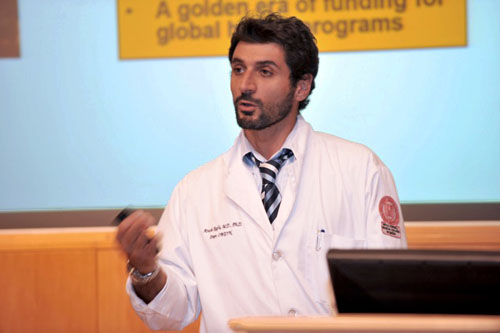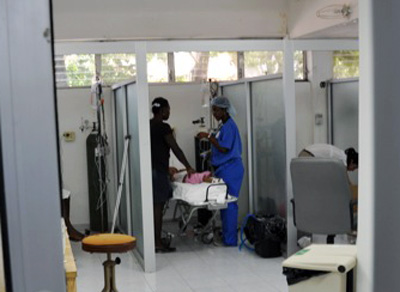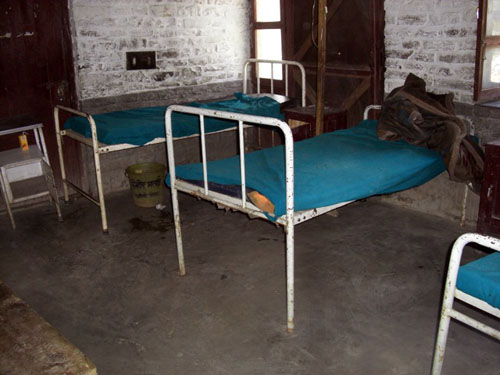Physician Explains Evolution of Global Health Industry
November 2010

Addressing a full-house lecture hall, Dr. Arash Rafii Tabrizi shares
insights about the evolution of global health from his visits to Haiti and
Nepal.
What was once an array of charities working independently to provide health care to the poorest villages in the world has now become an industry known as global health. Dr. Arash Rafii Tabrizi, assistant professor of genetic medicine in obstetrics and gynecology at WCMC-Q, spoke recently to a full-house audience at the college about this “paradigm shift” in health care throughout the developing world.
“We are moving far away from the picture of one physician holding a smiling child,” he explained in a discussion sponsored by the WCMC-Q student global health club. “That’s not global health anymore. It’s become way more organized and is taking on a more industrialized form.”
Where health care used to be viewed country by country, administered by local governments, Dr. Rafii Tabrizi said that now people are looking at health care needs across the planet. Instead of targeted funding that limited physicians to treating one specific disease no matter the situation, funding now supports health centers with goals that are more adaptable to local conditions. This shift has been catapulted by a huge increase in funding allocated to global health, he added.
“Every major university in the U.S. has a global health department,” he said. “People like Bill Gates are inspiring this shift because they give money—changes like these are very money driven.”

A patient is treated at the Gheskio clinic in Haiti--Dr. Arash Rafii Tabrizi
explained how walls between beds are among recent developments at
the clinic that provide privacy and improved hygiene.
In his lecture, Dr. Rafii Tabrizi explained the evolution of his own thinking as he approached traveling to work in Haiti. Through research before his trip, he realized that the emphasis has moved away from number of patient visits and procedures to ways a doctor can work with and train others to make a maximum impact over the long term.
“So we moved from this approach of ‘me alone and I can save the whole world’ to ‘I need a lot of things to actually change things around,’” he said.
He also noted that global health leaders are starting to think differently about the allocation of funds to improve quality and ensure long-term impact in the poorest regions.
“The goal is not to simply reduce costs alone,” he explained. “Everyone is trying to shrink the budget at the expense of quality in these countries, but a lot of studies have shown that containing costs and putting front-end research into the best materials, rather than just going cheap, actually improves quality.”
Bringing life and poignancy to his presentation, Dr. Rafii Tabrizi shared photos and stories from his experience training doctors to perform surgical procedures in Haiti at the Cornell-affiliated Group for the Study of Kaposi's Sarcoma and Opportunistic Infections (Gheskio) clinic. Since Haiti sees one of the highest rates of HIV, residents must get tested before becoming Gheskio members, at which point they receive free health care. This system motivates people to join, he said, and Gheskio has half a million patients on file to prove it.

A hospital ward in Nepal--it's crucial for visiting doctors to know locals
so they communicate effectively and maximize their impact, imparting
knowledge and improving facilities that already exist.
“Systems like these are based on a health care framework—versus a mission for one or two weeks—that actually improves the value of health care provided and encourages the creation of a dynamic system that will rapidly improve the quality of life for people involved in it.”
The new, comprehensive perspective on global health means that local health centers impact the overall health of their communities in terms of providing jobs so residents have basic necessities.
“We don’t want to reinvent the wheel but instead come into an existing facility and figure out how to get it running and its staff trained so locals can oversee it at every level,” Dr. Rafii Tabrizi explained. “This impacts health care in a range of ways—just think: if people are jobless and hungry, they are going to sell half the drugs you give them to get money.”
Dr. Rafii Tabrizi spent time in Nepal as well to conduct site visits. He noted the extreme conditions of the facilities there with slides and discussed a severe gynecological condition that affects and debilitates nearly 40 percent of mothers there.
“The big goal is universal coverage—everybody should be covered, we should have exactly the same standard of care in Paris, in New York, in Doha and in Katmandu,” he said.
By Emily Alp
